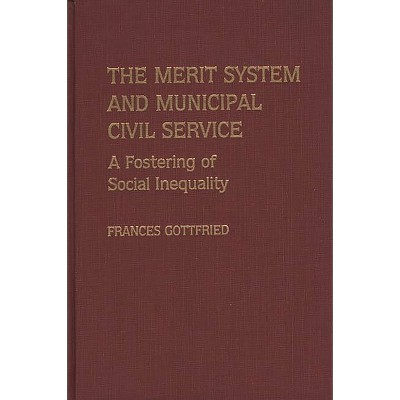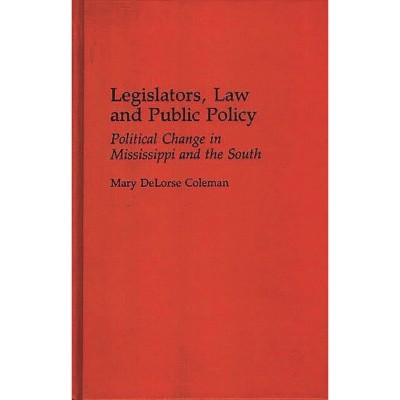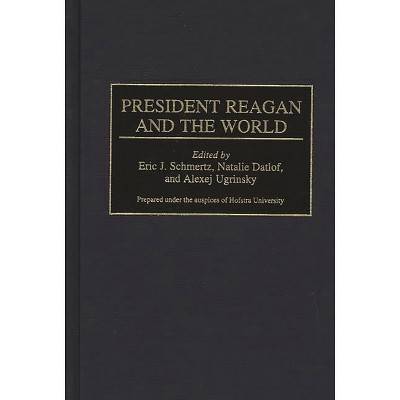Sponsored

The President and Civil Rights Policy - (Contributions in Political Science) by Steven a Shull (Hardcover)
In Stock
Sponsored
About this item
Highlights
- The most thorough, systematic, and historical examination of the interrelations of the president and other participants in civil rights policymaking, The President and Civil Rights Policy investigates the process from agenda setting through implementation and even reviews policy impact.
- About the Author: STEVEN A. SHULL is Professor of Political Science at the University of New Orleans.
- 270 Pages
- Political Science, History & Theory
- Series Name: Contributions in Political Science
Description
About the Book
The most thorough, systematic, and historical examination of the interrelations of the president and other participants in civil rights policymaking, The President and Civil Rights Policy investigates the process from agenda setting through implementation and even reviews policy impact. Emphasizing the themes of leadership and change, Shull surveys the numerous policy tools available to a president committed to policy change. Although historical components are reviewed, the stress here is on the contemporary presidency. Included is a ground-breaking, detailed assessment of the Reagan administration that provides our first look at the president's role in a vital issue across the entire policymaking process. Shull finds that the American president is the most prominent catalyst for most public policy programs, with domestic issue areas like civil rights, often allowing the greatest discretionary latitude. This crucial issue functions as a barometer of presidential influence, priority, and action, as what presidents choose to do may be largely up to them. Some presidents, such as Lyndon Johnson, have initiated civil rights policies, whereas others, such as Ronald Reagan, have acted to restrict government's role and have turned back the civil rights clock. The main thrust here is that committed presidents lead and without leadership, little change in policy occurs.
Various kinds of evidence from quantitative data on statements, actions, and results, as well as memoirs and interviews are used to document the presidents' impact on civil rights policy. More than forty tables scrutinize almost every perceivable aspect of this subject, from Major Events in the Struggle for Racial Equality to Average Expenditures (Outlays) for Civil Rights, and Characteristics of Federal District and Appellate Court Judges. The volume's four major divisions present a framework for the analysis, focus on the president's role in agenda setting and policy formulation, delineate the roles of others and their responses to presidents' statements and actions, and assess presidential impact. This timely and detailed study will be useful supplementary reading in graduate and advanced undergraduate courses in the presidency, American government, civil liberties, and in public policy courses, especially those using the process or content form of organization.
Book Synopsis
The most thorough, systematic, and historical examination of the interrelations of the president and other participants in civil rights policymaking, The President and Civil Rights Policy investigates the process from agenda setting through implementation and even reviews policy impact. Emphasizing the themes of leadership and change, Shull surveys the numerous policy tools available to a president committed to policy change. Although historical components are reviewed, the stress here is on the contemporary presidency. Included is a ground-breaking, detailed assessment of the Reagan administration that provides our first look at the president's role in a vital issue across the entire policymaking process. Shull finds that the American president is the most prominent catalyst for most public policy programs, with domestic issue areas like civil rights, often allowing the greatest discretionary latitude. This crucial issue functions as a barometer of presidential influence, priority, and action, as what presidents choose to do may be largely up to them. Some presidents, such as Lyndon Johnson, have initiated civil rights policies, whereas others, such as Ronald Reagan, have acted to restrict government's role and have turned back the civil rights clock. The main thrust here is that committed presidents lead and without leadership, little change in policy occurs.
Various kinds of evidence from quantitative data on statements, actions, and results, as well as memoirs and interviews are used to document the presidents' impact on civil rights policy. More than forty tables scrutinize almost every perceivable aspect of this subject, from Major Events in the Struggle for Racial Equality to Average Expenditures (Outlays) for Civil Rights, and Characteristics of Federal District and Appellate Court Judges. The volume's four major divisions present a framework for the analysis, focus on the president's role in agenda setting and policy formulation, delineate the roles of others and their responses to presidents' statements and actions, and assess presidential impact. This timely and detailed study will be useful supplementary reading in graduate and advanced undergraduate courses in the presidency, American government, civil liberties, and in public policy courses, especially those using the process or content form of organization.Review Quotes
?An historical examination of the interrelations of the US president and other participants in civil rights policymaking, from agenda setting, through implementation and reviewing policy impact. Some presidents, such as Lyndon Johnson, have initiated civil rights policies, whereas others, such as Ronald Reagan, have acted to restrict the government's role and have turned back the civil rights clock. The main thrust of the volume is that committed presidents lead, and without leadership, little change in policy occurs.?-HRI Reporter
?Shull's earlier studies in presidential policy-making are supplemented by the present volume on the role of the president in civil rights policy formation and implementation. The author uses a five-stage analysis of the policy-making process--agenda setting, formulation, modification-adoption, implementation, evaluation--to pursue several themes. One is a comparative policy-making study of the leadership roles of recent presidents, from Truman on. Tied to this is an examination of presidential leadership itself, and the allied question about the kind of policy changes, if any, presidents are able to achieve. The book also supplies useful suggestions about research methods for policy-making studies. Finally, Shull provides information about the roles of the legislature, the courts, the bureaucracy, and public opinion/interest groups in the development of policy. Unsurprisingly, the author concludes that presidents do make a difference in leadership and change, but that different presidents make different kinds of difference, the strongest contrasts being between Johnson and Reagan. Strong on guides to information . . . will be of greater use to advanced researchers than to beginning students.?-Choice
?The authors of the chapters in this book show the complexity of the presidential roles in civil rights policy... This book will be of intrest to academics and professionals who are interested in presidental roles in civil right policy. The book does make it possible for the interested reader to get a more in-depth understanding of the presidential role in this important policy arena.?- The Journal of Intergroup Relations
"An historical examination of the interrelations of the US president and other participants in civil rights policymaking, from agenda setting, through implementation and reviewing policy impact. Some presidents, such as Lyndon Johnson, have initiated civil rights policies, whereas others, such as Ronald Reagan, have acted to restrict the government's role and have turned back the civil rights clock. The main thrust of the volume is that committed presidents lead, and without leadership, little change in policy occurs."-HRI Reporter
"The authors of the chapters in this book show the complexity of the presidential roles in civil rights policy... This book will be of intrest to academics and professionals who are interested in presidental roles in civil right policy. The book does make it possible for the interested reader to get a more in-depth understanding of the presidential role in this important policy arena."- The Journal of Intergroup Relations
"Shull's earlier studies in presidential policy-making are supplemented by the present volume on the role of the president in civil rights policy formation and implementation. The author uses a five-stage analysis of the policy-making process--agenda setting, formulation, modification-adoption, implementation, evaluation--to pursue several themes. One is a comparative policy-making study of the leadership roles of recent presidents, from Truman on. Tied to this is an examination of presidential leadership itself, and the allied question about the kind of policy changes, if any, presidents are able to achieve. The book also supplies useful suggestions about research methods for policy-making studies. Finally, Shull provides information about the roles of the legislature, the courts, the bureaucracy, and public opinion/interest groups in the development of policy. Unsurprisingly, the author concludes that presidents do make a difference in leadership and change, but that different presidents make different kinds of difference, the strongest contrasts being between Johnson and Reagan. Strong on guides to information . . . will be of greater use to advanced researchers than to beginning students."-Choice
About the Author
STEVEN A. SHULL is Professor of Political Science at the University of New Orleans. He is currently coauthoring Congress and the President: The Policy Connection. His previously published books include Interrelated Concepts in Policy Research, Presidential Policy Making, and Domestic Policy Formation (Greenwood Press, 1983) as well as numerous articles on social science and political topics published in, among others, the Journal of Politics, American Politics Quarterly, Western Political Quarterly, and Social Science Quarterly.










